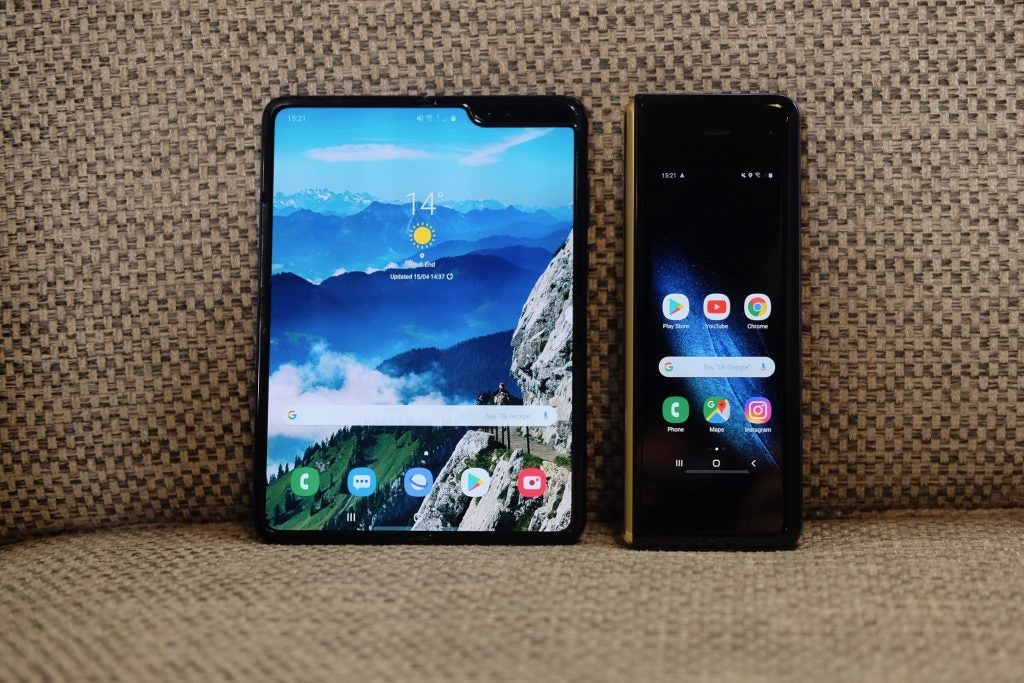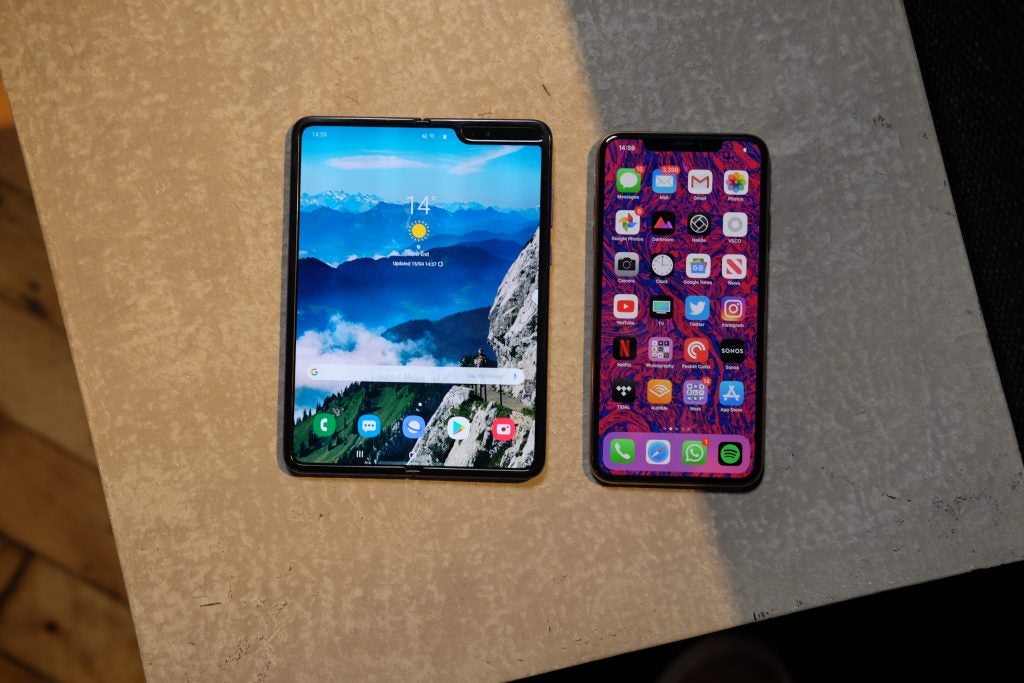Update: Samsung Galaxy Fold delayed
After months of delays, Samsung has finally announced that the Galaxy Fold will ship out to customers, in a slightly redesigned form, from September.
A statement from Samsung read: “At Samsung, we’ve always focused on pioneering the next generation of mobile innovation: new products and technologies that push the entire industry forward and help users do what they can’t. Earlier this year, we announced Galaxy Fold—Samsung’s first foldable device, and the beginning of an entirely new mobile category. Since then, we’ve made improvements to Galaxy Fold to ensure consumers have the best possible experience.”
Samsung Galaxy Fold hands on
A few months have passed since the Galaxy Fold was announced alongside the Galaxy S10 and a week before the Huawei Mate X, kicking off the foldable phone future in the process.
- Read our Samsung Galaxy S10 review
Samsung Galaxy Fold Design and Screen – What’s it like to use?
I spent about an hour playing with the Galaxy Fold during a Samsung briefing event in London and while I don’t think it does everything right, it has certainly got me excited about the uses foldable phones can offer – even if this does feel like a true first-gen product. We should point out we did not have long enough to confirm reports of breaking screens ourselves.
The first thing you’ll notice is how well built it is (ironically). The folding motion is smooth and clicks into place; it feels thoroughly satisfying and I couldn’t help but just sit there folding and unfolding it multiple times, staring at how unique a flexible display looks. How well it lasts over time, of course, should be of concern, especially when the price is within touching distance of £2000/$2000, but Samsung seemed confident, proclaiming that the Fold is a device that’s built to last.
- Read our Samsung Galaxy S10 Plus review
- Read our Samsung Galaxy S10e review

The Galaxy Fold packs two screens: a 4.6-inch, HD+ Super AMOLED outer display with a 21:9 aspect ratio, and a 7.3-inch, QXGA+ Dynamic AMOLED inner “Infinity Flex” display with a 4.2:3 aspect ratio. The Fold opens up like a book, and when closed it essentially looks like two phones stuck together. It feels like it too, and you’ll notice it’s much bulkier in a pocket than pretty much any other flagship phone.
We’ve finally folded the Samsung Galaxy Fold! @SamsungUK pic.twitter.com/JwQwY9MJqm
— Trusted Reviews

(@trustedreviews) April 15, 2019
Holding the Fold when it’s closed isn’t what I was expecting at all. The small outer screen is tiny by today’s standards and it has a comically large top and chin. Thing is, it’s so narrow and easy to hold I can see this being used solely for checking the odd message, taking a call and keeping an eye on your route. Almost every other action will likely be done with the phone open. This clearly isn’t the ideal look Samsung is going for, though, and really feels like a sacrifice that had to be made for this first-generation product.
The near-square display is most comparable to an iPad Mini – broken only be a very annoying notch towards the right side – and anything you’re looking at on the front screen mirrors to the larger panel when you open the phone up. If you’ve got Google Maps open and you unfold the device then it instantly switches the big screen without any fuss or lag.

The 4:3 aspect ratio isn’t ideal for video, however, it’s great for browsing and reading. Samsung’s tweaked its multitasking software heavily here and as a result you can keep three windows open at once. As an example, I had a web page taking up half the panel, a YouTube video boxed out in the lower right and a notepad nestled in at the top.
The idea that I can unfurl the Fold when I am sitting on the train or bus without getting another device out is arguably the one killer reason for foldable as a class of device. I’d say Samsung wants the Fold to replace both a tablet and phone and in some ways it works. The problem is that the biggest sacrifice feels like the phone part.
One slight issue with the display, and I am not yet sure whether or not this will be obvious in normal use, is the very visible fold line down the middle. Look at the screen directly and you’ll likely miss it; a glance from an off-axis angle and the crease left by the fold line becomes very obvious.
- Read our Huawei P30 Pro review

The hype surrounding the Fold felt like it dipped as soon as Huawei launched the equally foldable Mate X. The Mate X’s single screen folds outwards, as opposed to two external and internal screens on the Fold, and the whole way it fits together feels so much more complete than the Fold as a result. I could see myself jumping straight into using the Mate X, while I think they’ll be some major adjustments needed to help with the Fold feel familiar.
- Read our Huawei Mate X review: hands on
Samsung Galaxy Fold − Specs, camera and features
The Galaxy Fold might be all about the design and the completely different form-factor but that’s not to say this isn’t going to stand out as one of the most specced-out smartphones of 2019.
Inside you’ll find a Snapdragon 855 chipset across all regions and a whopping 12GB of RAM, as well as 512GB of internal storage. That large amount of RAM is needed to ensure multiple windows can be kept open without running into any issues.

There’s not one but two batteries − one on each half − that will work in tandem. Samsung says the Fold’s total battery capacity is 4380mAh which feels a little on the small side if I’m being honest. There’s a seriously large amount of phone here that needs powering and if the Fold has the same endurance issues as the Galaxy S10, then getting through a whole day without additional charge time might be an issue. Again, first-gen products tend to have obvious issues and battery life could very well be one here.
The Galaxy Fold can be used to wirelessly charge another device via Wireless PowerShare. AKG-tuned speakers are on board, too, as well as UFS 3.0 support. There’s no microSD card slot, however, and the fingerprint scanner is a physical unit on the side rather than the in-display variety. Having disliked the ultrasonic sensor on the S10 and enjoying the side-mounted one on the S10e this feels like more of an upgrade than a sacrifice.
You’ll find six cameras dotted about the Fold. On the rear there’s a 16-megapixel, f/2.2 ultra-wide camera, a 12-megapixel wide-angle camera and a 12-megapixel telephoto sensor; on the inside is a 10-megapixel f/2.2 camera and an 8-megapixel f/1.9 RGB depth camera; on the front sits a 10-megapixel f/2.2 sensor.

Optically things are mostly the same as the S10 and one would assume the pictures will look pretty similar too.
Samsung Galaxy Fold – Price and release date
The Galaxy Fold was originally supposed to be released on April 26 in the US and May 3 in the UK. This is no longer the case as Samsung has delayed release. It’ll now be available in September.
The post Samsung Galaxy Fold appeared first on Trusted Reviews.

EmoticonEmoticon